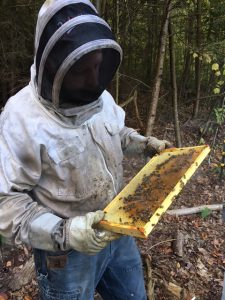WESTFIELD-As beekeepers across the state diligently work to sustain their hives under attack, the Massachusetts Beekeepers Association will hosts its fall meeting at Westfield State University to address concerns and offer solutions.
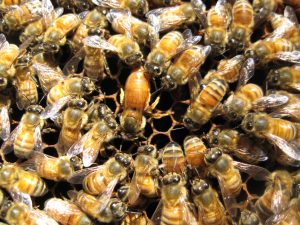
Andrew Preissner and Joyce Munson capture the queen bee at work in one of their hives in the Suffield, Conn. area.
The association, known as Mass Bee, will conduct its gathering on Nov. 11 in Scanlon Hall from 9 a.m. to 4 p.m. Coordinating logistics for the meeting are members of the Hampden County Beekeepers Association, Nathan Sperry of Russell, instructor and department head of horticulture technology at Westfield Technical Academy, and Andrew Preissner, owner of Amp Tech Consulting, LLC, in Suffield, Conn. Preissner serves as vice president of the local club.
“This is a big deal for Westfield,” said Preissner, noting that most of the Mass Bee meetings are conducted in the eastern part of the state. The event is sponsored by Westfield State University’s Environmental Science Department.
Both men encourage area residents who are interested in the state bee population to attend.
“I consider myself to be the vet of my bees so the more knowledge I have the better vet I can be,” said Sperry, noting he has 50 hives across the Pioneer Valley in a 25-mile radius. “The meeting will highlight the pressures on today’s bee hives including diseases and viruses transmitted by mites.”
Dr. Meghan Milbrath, MPH, Ph.D., an academic specialist in the Entomology Department at Michigan State University, is one of the speakers for the event.
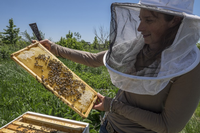
Dr. Meghan Milbrath, MPH, Ph.D., will be a featured speaker at the fall meeting of the Massachusetts Beekeepers Association at Westfield State University.
“It is a lot harder to keep bees healthy now than it has in the past,” said Milbrath. “A lot of people have started to keep bees, and are really struggling to keep them alive and in good health. We will talk about the things that beekeepers can do to make sure that their animals are well taken care of and in the best health.”
Milbrath’s lecture will be structured in two parts – the biology of the worst pest for honey bees, a mite called Varroa destructor, and how to keep one’s apiary sustainable by producing its own bees.
“This pest has completely changed beekeeping after it came to the United States a few decades ago, responsible for the deaths of hundreds of thousands of colonies,” said Milbrath, adding she will discuss options to beekeepers to keep their colonies safe from the mite.
“Many small scale beekeepers lose many or all of their colonies every year (often to the Varroa mite), and purchase bees from across the state to replace them,” said Milbrath. “I will teach a method of using your existing colonies to prepare for potential loss.”
Rachael E. Bonoan, a Ph.D. candidate at Tufts University in Medford studying honey bee health and nutrition, will also be a featured speaker, discussing her findings as well as other insect pollinators. She also serves as president of the Boston Area Beekeepers Association.
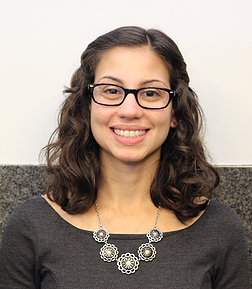
Rachael E. Bonoan, a Ph.D. candidate at Tufts University, will discuss her findings on honey bee health and nutrition, at the fall meeting of the Massachusetts Beekeepers Association.
“Honestly, it is about more than the honey bee,” said Bonoan. “Honey bees are an important, managed, commercial pollinator which makes their decline relatively easy to track and study. There are insect pollinators other than honey bees that are also important to our economy and agriculture, that are also on the decline. Whatever we can learn about honey bees will help inform conservation of other important insect pollinators.”
Bonoan’s presentation will center on how honey bee nutrition, and thus pollinator nutrition, is affected by the environment.
“Natural seasonal shifts in floral distribution and abundance (and thus pollinator food) will be discussed as well as commercial pollination practices,” said Bonoan.
Milbrath’s goal for the meeting is to leave beekeepers with a sense of empowerment at the end of the day.
“I would like to leave beekeepers with tools to keep their bees healthy and their operations sustainable,” said Gilbrath.
Bonoan echoed those sentiments.
“There are a lot of factors affecting honey bee nutrition that we can’t necessarily control (like pesticides and the Varroa mite) but we can control what type of flowers, and thus nutritional resources, are available to pollinators,” said Bonoan.
Persons attending the conference must be a Mass Bee member. Persons can join online or pay for membership at the door; however, lunch must be reserved at least one week before the meeting. Lunch menu items – priced at $15 – include a variety of sandwich choices or salad, fruit, all natural chips, water and cookie.
“We encourage hobbyists to attend to support Mass Bee,” said Preissner, who has eight hives in a 10-mile radius that he sustains with fiancée Joyce Munson. “The speakers will be informative and there will be a variety of resources for beekeepers.”
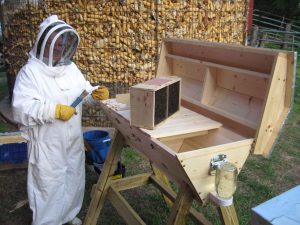
Joyce Munson installs a package of bees into a top bar beehive. Munson and Andrew Preissner oversee eight hives in a 10-mile radius in the Suffield, Conn. area. (Submitted photo)
For more details on Mass Bee’s fall meeting, visit massbee.org.
On a related note, the Hampden County Beekeepers Association meets on the second Thursday of each month at the Willimansett Heights Improvement League in Chicopee. The next meeting is set for Oct. 12 at 7 p.m. and is open to the public. Also, the club will be sponsoring a Bee School on Jan. 20, Feb. 24, and March 17 from 9 a.m. to 3 p.m. at Holyoke Community College. The cost for the series of classes is $90. For more details, visit hcbee.org.
“For anyone interested in beekeeping, topics at the Bee School will range from building equipment, obtaining bees and learning general maintenance of hives, to harvesting honey,” said Sperry.
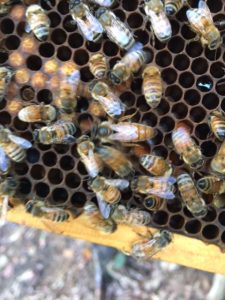
A honey bee queen is responsible for laying all the eggs in a beehive. Beehive owned by Nathan Sperry of Russell. (Submitted photo).

